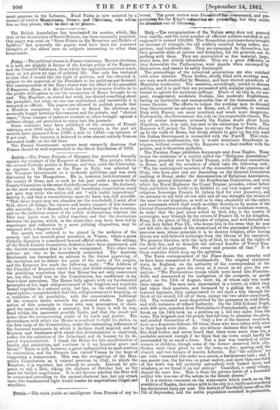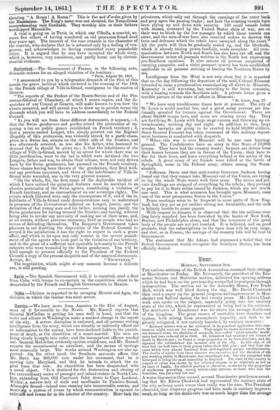Sfahr.—The reorganization of the Italian army does not proceed very
rapidly, and the total number of efficient soldiers enrolled is not
supposed to exceed 150,000. The Neapolitan provinces have brought no increase of strength, the old soldiery received being sullen, sus- picious, and insubordinate. They are encamped by themselves, but they grumble alike at rations and discipline, till the generals can do nothing with them. They are represented as fine material, large, heavy men, but utterly intractable. They are a great difficulty, as they demoralize the Piedmontese, want guards when encamped by themselves, and cannot be safely discharged. The proceedings of the industrial associations are also watched with some interest. These bodies, chiefly filled with working men, are very much controlled by Mazzini, and have elected presidents of Mazzinian tendencies. The societies, accordingly, intend to discuss politics, and it is said they are permeated with socialist opinions, and intend to agitate for universal suffrage. Much of all this is, we sus- pect, exaggerated, moderate Italians, like moderate Englishmen, having an instinctive and unreasonable fear of the discussion of ex- treme theories. The efforts to induce the working men to demand from Government an advance on Rome, and, if possible, to embroil Italy with France, are more practical, and much more dangerous. Fortunately, the Government can rely on the respectable classes. The cry of course increases intensely the Italian doubt about Louis Napoleon, who, it is said, has sent in his ultimatum to Turin. The Emperor will permit the Italians to occupy the Papal States almost up to the walls of Rome, but firmly refuses to give up the city until the Italian Government is reconciled with the Pontiff. This state- ment requires confirmation, but it would terminate Bourbonist in- trigues, without committing the Emperor to a final conflict with the priests, and is therefore probable.
The Parisian Temps publishes documents sent from Naples. These reveal the existence of a society called the "Religions Association," in Rome, presided over by Count Trapani, with affiliated committees in Rome, and all the members of which take the following oath: " We, the undersigned members of the committee of the commune of Gioja, who form part and are depending on the General Committee residing at Rome, under the denomination of Religious Association, with the general directions of the Bourbonian Committee, and over which his Royal Highness the Count Trapani presides, swear before God and before the world to be faithful to our very august and very religious Sovereign Francis II. (whom God for ever preserve), and we promise to aid with all our soul and all our strength the return of the same to our kingdom, as well as to obey absolutely all the orders and commands which shall reach us either directly or by means of the Central Committee residing at Rome. We swear to maintain secrecy, in order that the just cause willed by God, who is the master of sovereigns, may triumph by the return of Francis II. to his kingdom, King, by the grace of God, defender of religion, and well-beloved son of our holy father Pius IX., who keeps him in his arms that he may not fall into the hands of the wicked and of the pretended Liberals— perverse men, whose principle it is to destroy religion, after having driven our well-beloved sovereign from the throne of his ancestors. We promise likewise, with the help of God, to claim all the rights of the Holy See, and to demolish the infernal Lucifer of Victor Ema- nuel and of his partisans. We swear and promise all that." It is these societies which keep up the agitation. The Turin correspondent of the Times denies the atrocity said to have been committed at Pontelandolfo. The original statement rests, in England, on the authority of the correspondent of the Times, and as we gave his story as it stood, so we give the cor- rection : " The Piedmontese troops which were lured into Pontelan- dolfo and massacred at the instigation of the areiprele, or parish priest, on the 11th of August, were 41, of whom only two made their escape. The men were surrounded in a tower, in which they had taken their quarters, and harassed by a galling fire as, with lowered bayonets, they endeavoured to cut open a way through the thick of the crowd, till all of them, except the two above mentioned, fell. The wounded were despatched by the peasantry in cold blood, and with instances of refined barbarity. On the 13th Colonel Neggrin, with 400 men, marched from Pietralemato Pontelandolfo, and at
day- break on the 14th took up a position on a hill two miles from t town. The brigands and the people had full time to abandon the place, and availed themselves of it. Only a few of the bravest remained, bent on a desperate defence. Of these, those who were taken with arms in their hands were slain. An eye-witness declares that only saw five dead bodies, and never heard that there were more than ten, a probable account enough if we think that the town could hardly be surrounded by so small a force. Not a hair was touched of either women or children, though some of the former deserved little pity. Orders were then given to set the town on fire; sparing only the church and two houses of known Liberals. But `the soldiers,' we are told, executed this order as a cora t, a burdensome task; and, I can assure you, the fire was no great matter, and more than one-third of the town was left perfectly untouched, with barred doors and windows, as we found it on our arrival.' Casalduni, a small village, shared the same fate. This is from the private letter of a Lombard soldier who was one of the actors in the bloody drama." It is a curious comment on the statements which reach us on the condition of Naples, that crime with in the city (i.e. thefts and murders) has diminished sixty per cent. The festival of Garibaldi came off on the 7th of September, and the entire population marched in procession, shouting "A Roma ! A Roma!" This is the stet d'ordre given by the Mazzinians The King's name was not shouted, the Neapolitans comprehending only Garibaldi. They worship him as their fathers worshipped Masaniello.
A trial is going on in Turin in which one Cibolla, a convict, se- cuses five others of having murdered an old procuress found dead four years ago. The interest of the case consists in the character of the convict, who declares that he is actuated only by a feeling of ven- geance, and acknowledges to having committed every punishable crime. It is argued that he may have invented the whole story, which is, however, very consistent, and partly borne out by circum- stantial evidence.































 Previous page
Previous page